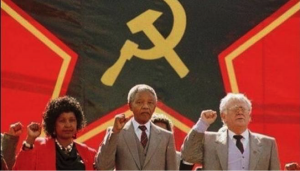When colonialism came to an end in Africa throughout the mid-1900s, the Western colonial powers left a gaping hole in the political fabric of the newly- independent African states. Throughout the colonial period, conflicts had been resolved with violence, not democracy and diplomacy (Falola 171, 181).[3] Consequently, most nations across Africa lacked stable political leadership and experienced at least one if not multiple coups following independence. Additionally, colonial policies of separate development as well as their divide and rule strategy created sub-nationalistic sentiments in many countries that resulted in leaders favoring one ethnic group at the expense of the others (Ochonu 1).[4] Political corruption has its roots in colonialism and has been perpetuated by a neocolonial system that fails to hold both foreign and domestic leaders accountable for their actions.
Roots of Corruption
Colonialism
Corruption is rooted in colonial policies. For example, in Nigeria during the colonial period, specific efforts were made to separate Northerners in order to keep them culturally pure. Frederick Lugard, who was a governor of Nigeria, identified the Northerners as being cooperative and the Yoruba in the south west as “very intelligent and progressive,”[5] “politically advanced,”[6] and “among the most intelligent of African peoples[7]” (Lugard 378, 380, & 383). Conversely, he described the Igbo as “bewildering”[8] (Lugard 386) and characterized them as having a “lack of political organization,”[9](Lugard 386). In addition to political reorganization, education was viewed as essential to the success of colonialism in Nigeria. In fact, according to Lugard, “education alone can suppress some of their barbarous customs, which at present are basic to the tribal organization, but we are warned that education must wait upon a proper understanding of the peoples by which alone co-operation can be secured” (Lugard 383).[10] Northerners were reluctant to accept education according to Lugard because the Muslims were suspicious of the Christian missionaries that ran the schools. Conversely, the southerners were “always enthusiastically eager for schools” (Lugard 390).[11] This led to an educated elite in the south, and a culturally isolated north at independence, something that occurred commonly across the continent of Africa. Following a series of coups and a civil war, the military seized power and implemented strongly statist policies (Mbanku 38-39).
Excessive Statism
As a solution to the constant coups and unruly warlords that resulted largely from colonialism, many advocated for a strong state. “Excessive intervention in private exchange has provided state custodians with opportunities and the wherewithal to enrich themselves at the expense of the rest of the people. Hence, corruption became very pervasive” (Mbaku 3).[12] Essentially, the problems that the colonialists had left Africa with were supposedly going to be solved by a stronger state government. The reality though was that strong state governments often exploited their citizens, using up natural resources for their own benefit at the expense of their people.
Cold War
During the Cold War “superpowers and their allies used aid as a weapon in their competition” (Radin 1990).[13] Western powers would also give political support in exchange for trade, particularly oil, regardless of whether or not the ruler they were supporting was corrupt. This allowed corrupt politicians to continue to stay in power and abuse their people (Curtis 246-247). [14]

Non-Monetary Corruption in Kenya
Despite constitutional attempts to foster democracy in Kenya after their independence in, it was never effectively implemented (Dibie).[15] Under the rule of Jomo Kenyatta, democracy was championed as the future of the country, but he had no true intentions of carrying out the plans that the people had fought for. The plan included the implementation of a multiparty political system, a quasi-federal form of government with six regions, each with a Regional Assembly responsible for agricultural land, primary and intermediate education, local government, and public health (Dibie).[16] However, the plan proved to be a political ploy to hasten independence (Dibie).[17] In response to the failure of the plan, coupled with growing uneasiness about Kenyatta’s rule, the Kenya People’s Union (KPU) was formed. The KPU was a formidable opposition party, but it was promptly banned by Kenyatta in 1969 (Dibie).[18] Kenyatta went so far as to ban current or ex-KPU members from running in the general election in 1969. Though directly championing democracy, it was clear that Kenyattta’s intentions were not congruent with his public statements. Corruption is often spoken of from a monetary perspective, but it also involves situations like this where deceptive promises are made in order to mobilize political support, only for the promises to be later broken once a leader attains power.
Sanctions and Other Anti-Corruption Measures
Various studies (e.g., Polinsky & Shavell 2001) have explored ways to use legal sanctions in order to minimize corruption on the continent. It is important to note though that legal sanctions may not be adequate to discourage politicians from engaging in corrupt practices (Mbaku 77).[19] For prosecution to be effective and without bias, law enforcement and the judiciary system must not partake in corruption, but these can be some of the most corrupt of government agencies (Mbaku).[20]
Today, many governments across the continent of Africa remain unwilling or unable to promote policies that benefit all of their citizens, not just their supporters (Mbaku).[21] These governments continue to look abroad for financial support, but this leaves them unaccountable to their own constituents, as they do not need popular support in order to stay financially stable (Mbaku).[22]
It is important to note that a great deal of modern day corruption occurs in countries that have incentive structures that leave these nations vulnerable to corrupt practices. In countries that have a weak legal system, corruption tends to be pervasive. Incentives provided by government institutions may be overpowered by social and financial incentives (i.e. nepotism, bribery, etc.) that are based in corrupt practices (Mbaku).[23] For example, Mbaku has recommended that one way to reduce corruption in the public service sector would be to improve civil service pay and make salaries competitive with private sector firms. This solution means that individuals who engage in corruption will lose a lucrative public position, which hopefully will dissuade government employees (Mbaku).[24]
Currently, in many African nations, government officials do not lose their jobs for engaging in corrupt activities. In fact, it was argued in a study conducted by Van Rijckeghem and Weder in 1997 that civil servants in countries where corruption is pervasive are likely to lose their jobs if they do not participate in these schemes (Mbaku).[25]
Consequences of Corruption

Nigeria, for example, is an incredibility oil rich country, but this leaves the government unaccountable to its people as they can survive off of oil revenues without collecting taxes from an angry public.
In terms of aid and development, there are two conflicting sides to the debate about why anti-corruption has become so pre-eminent in donor discourse, with such as a lack of what corruption itself is. [28] (Harrison) The two sides are as follows. There are those who strongly associate themselves with anti-corruption and for whom academic speculation about contested moralities is at best a waste of time and at worst a dangerous diversion (Harrison).[29] The prevalence of corruption in international dialogue is a reflection of its importance. [30] (Harrison) Conversely, some people argue that growth of anti-corruption is a part of a project of “normalization.” [31] (Harrison) This side argues that anti-corruption is closely associated with the governance agenda in development, itself a manifestation of greater intrusion of neo-liberalism in the architecture of aid. [32] (Harrison)
Works Cited
BBC. “Shell Admits Fueling Corruption.” BBC News. BBC News, 11 June 2004. Web.
2016.
Curtis, Mark. Unpeople : Britain’s Secret Human Rights Abuses. London: Vintage, 2004.
Print.
Dibie, Robert A. The Politics and Policies of Sub-Saharan Africa.
Falola, T. (2009). Colonialism and violence in Nigeria. Bloomington: Indiana University
Press.
Lanham, MD: U of America, 2001. Print.
Harrison, Elizabeth. “Corruption”. Development in Practice 17.4/5 (2007): 672–678.
Labelle, Huguette. “To End Poverty, You have to End Corruption.” The Huffington Post.
Lugard, Lord. “British Policy in Nigeria”. Africa: Journal of the International African
Institute 10.4 (1937): 377–400. Web…
Mbaku, John Mukum. Corruption in Africa: Causes, Consequences, and Cleanups.
Lanham, MD: Lexington, 2007. Print.
McCain, Robert. “Mandela’s African Cold War.” The American Spectator. The Spectator,
- Web. 2016.
Ochonu, Moses E. Colonialism by Proxy : Hausa Imperial Agents and Middle Belt
Consciousness in Nigeria. Bloomington: Indiana UP, 2014. Print.
Radin, C. A. (1990, May 31). COLD WAR ENDING, AND AFRICA IS LOSING.
Boston Globe (Pre-1997 Fulltext) Retrieved from
https://login.proxy.library.emory.edu/login?url=http://search.proquest.com.proxy.library.emory.edu/docview/294522525?accountid=10747
[1] BBC. “Shell Admits Fueling Corruption.” BBC News. BBC News, 11 June 2004. Web. 2016.
[2] McCain, Robert. “Mandela’s African Cold War.” The American Spectator. The Spectator, 2013. Web. 2016.
[3] See Falola 171, 181 (2009)
[4] Ochonu 1
[5] See Lugard 378
[6] See Lugard 380
[7] See Lugard 383
[8] See Lugard 386
[9] See Lugard 386
[10] See Lugard 383
[11] See Lugard 390
[12] See Mbaku 3
[13] See Radin 1990
[14] See Curtis 246-247
[15] See Dibie 121
[16] See Dibie 121
[17] See Dibie 122
[18] See Dibie 121
[19] See Mbaku 77
[20] See Mbaku 77
[21] See Mbaku 77
[22] See Mbaku 77
[23] See Mbaku 77
[24] See Mbaku 78
[25] See Mbaku 78
[26] See Mbaku 37
[27] See Labelle 2013
[28] See Harrison 675
[29] See Harrison 675
[30] See Harrison 675
[31] See Harrison 675
[32] See Harrison 675